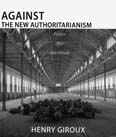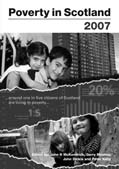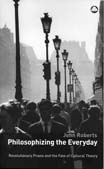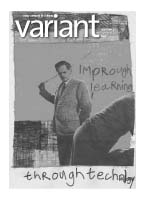Creative Industries - call for articles ...
...to develop critical understanding and to broaden public discussion about 'Creative Industries' as a key aspect of contemporary policy that is presumed to address inequality. Full details: www.variant.org.uk/CI.html
|
|
|
Variant 29 Summer 2007
text pdf
Front cover
Jonathan Owen and Neil Grassie
pdf
|
Who Are You to tell me to Question Authority?
Radical education in a ‘proto-fascist’ era
Benjamin Franks
A comprehensive review of Henry Giroux's 'Against the New Authoritarianism', a well-researched polemic that identifies the threat of authoritarianism in the nexus of hierarchical institutions that have formed in the United States, where the images from Abu Ghraib provide Giroux with a significant set of 'proto-fascist' texts for discussing the wider social processes that produced them.
text pdf
|
 |
|
Closed Circuit Tunnel Vision
Tom Jennings
An incisive review of Andrea Arnold’s Glasgow-set film, the suspense thriller 'Red Road'. Jennings posits that Arnold in intending to question the ramifications of surveillance in Britain "explains the apparent acceptance of the state’s intrusiveness in terms of 'our national psyche'". A reference which he details as being beyond current affairs' hysterical hyperbole and the film's erstwhile critical reception.
text pdf
http://www.tomjennings.pwp.blueyonder.co.uk
|
Comic & Zine Reviews
Mark Pawson
Pawson opens the eclectic pages of: Hitsville UK: Punk in the Faraway Towns,
Duke, Anorak, Okido, Street Play, Tour de Fence, Here, Foie Gras, I Can’t Draw, Your Mum, Dishwasher: One Man’s Quest to Wash Dishes in All Fifty States...
text pdf
http://www.mpawson.demon.co.uk
|
‘Reframing the Poverty Debate’ the New Labour Way
Gerry Mooney
"Poverty is back on the agenda, but back on it in particular and very worrying ways. ... how poverty is defined, understood and talked about says much about the shape and nature of any policy and political response to it." Here, Mooney draws "attention to some of the ways in which the question of poverty is being reconstructed by New Labour and an assortment of journalists, academics and social and political commentators today." And rather than a "neo-liberal vision of social justice premised on a celebration of the market" advances "an entirely different conception and understanding of social justice that argues for social and economic equality through an attack on wealth and vested interests."
text pdf
|
 |
The Agreed Truth & The Real Truth: The New Northern Ireland
Liam O’Ruairc
"The ‘historic’ restoration of devolution in Northern Ireland, on 8 May 2007, has been hailed by the media as marking the symbolic end of the conflict there. ... But is Northern Ireland really 'reaping the dividend of peace, stability and, it is to be hoped, impending prosperity' as the media is assuring us? And if so is it going to last" when "Northern Ireland has the lowest household incomes in the UK ... the gap between rich and poor is even larger than in the rest of Britain" and "Sectarianism is supposed to be solved by a system that institutionalises it."
text pdf
|
Multiple Agendas, Impossible Dialogues: Where Irish Studies and History of Art Meet
Lucy Cotter
Blow-by-blow conference report of ‘Irish Studies and History of Art: Impossible Dialogues?’ at the Association of Art Historians 2007 conference, University of Ulster, April 2007: "The main point of tension in such an interdisciplinary dialogue is the function and status of the national – which is central to Irish Studies and often seen as reductive in Art History."
text pdf
|
Loving Art
Tim Stott
Irish art criticism not contracted to the laborious recovery of meaning, or that puts interpretation in the service of promotion and general arts management, might engage instead in the intimate exchanges of lovers...
text pdf
|
Art School and the Old Grey Cardigan Test
Mick Wilson
There is a "topicality to the question of art education even within the mainstream of the international art world." But "within art education institutions established patterns of low-level conflict fail to pass over into open, critically accountable debate, dialogue or exchange. ... Many of the self-avowed bearers of the art school ‘tradition’ have been absorbed into an old grey cardigan kind of comfortable though miserable institutionalisation. The painful irony is that rehearsing matters in this way risks closing down the very discussion one is demanding..."
text pdf
|
The Critique of Everyday Life and Cultural Democracy
Alex Law
An unfolding review of John Roberts' study of the possibilities for cultural democracy 'Philosophizing the Everyday: Revolutionary Practice and the Fate of Cultural Theory', sixty years of critical theorising between 1917 and 1975 about everyday life and a conflicted reality, a more activist sense on which to hook a democratic cultural politics for today. Markedly, Law concentrates on Roberts' deepening excavation on the submerged figure, at least for cultural politics, of Henri Lefebvre.
text pdf
|
 |
Killing Culture (Softly)
Stephen Dawber
The draft Culture (Scotland) Bill was not negligible. It marked a dramatic recomposition of the relationship between the Scottish state apparatus and its cultural agencies: stronger centralised state control of cultural policy; mounting bureaucratisation across the sector; the branding of national culture for promotional gain; an insidious instrumentalisation of cultural practice and erosion of creative freedoms; and a commitment to declining state funding and increased privatisation. Dawber sets out the key tasks for cultural workers to recover cultural policy from the miasma of technocracy in which it has become lost...
text pdf
|
O Rose, thou art sick!
Outsourcing Glasgow’s Cultural & Leisure Services
On April Fools' Day , Glasgow City councillors rushed through the removal of the City’s entire Cultural and Leisure Services and staff from the control of the people and delivered them into the hands of bankers: the Charitable Trust and Trading Company ‘Culture and Sport Glasgow’. Drawing on UNISON and activist sources this is an otherwise missing public account of the hiving off of Glasgow's common good.
text pdf
www.glasgowcityunison.org.uk
www.citystrolls.com
|
Adult Educators, Adult Education and Progressive Social Movements
Gordon Asher interviews Stephen Brookfield, one of the pre-eminent writers and thinkers in the field of adult and continuing education and active participant in social movements. "When you create democratic space, which means that you as the teacher are not the sole source of authority, you’re starting to question the power of certain individuals in the college or the university to make judgements about whether the learning is valuable or not. Then you come right up against the issue of power and who has the right to make these judgements, which brings you up against the issue of social structure..."
text pdf
|



